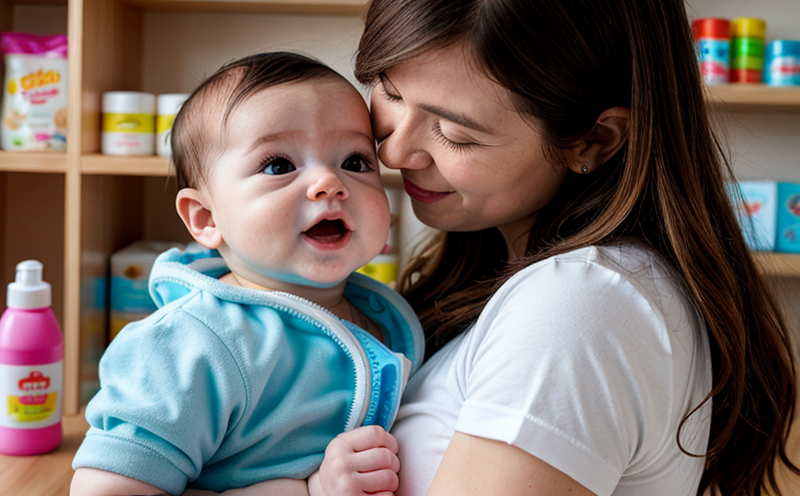Flexural Strength Testing in Baby Utensils
The demand for safe and durable baby products has grown significantly over the years. Flexural strength testing is a critical component of product safety testing, particularly when it comes to baby utensils such as spoons, sippy cups, and feeding bottles. This form of mechanical testing assesses how well materials resist bending stresses without breaking or deforming permanently.
Flexural strength testing evaluates the resistance of materials against bending forces, a crucial property for ensuring that baby utensils can withstand everyday wear and tear. The test involves subjecting samples to gradually increasing loads until they bend beyond their elastic limit, at which point permanent deformation occurs or failure happens. Understanding this property is essential in designing products that are not only functional but also safe enough for children's use.
The methodology of flexural strength testing typically follows international standards such as ISO 178:2019 and ASTM D790-23, which provide guidelines on sample preparation, test setup, and data interpretation. These standards ensure consistency across various labs worldwide, facilitating comparisons between different manufacturers' products.
For baby utensils specifically, the testing process often involves selecting appropriate sample sizes that mimic real-world usage scenarios. This could mean using actual-sized spoons or cups rather than oversized samples to better predict performance under typical conditions. Additionally, considerations must be made regarding surface finish and any coating treatments applied during manufacturing processes.
The importance of flexural strength testing cannot be overstated when it comes to protecting infants from potential hazards associated with poorly designed utensils. By conducting rigorous tests early in the product development cycle, manufacturers can identify weaknesses before they become safety issues for end users. Furthermore, compliance with relevant regulations like those outlined by ASTM F963-17 enhances brand reputation and consumer trust.
- Ensures durability against everyday use
- Identifies potential points of failure early in design stages
- Maintains regulatory compliance ensuring safe products reach market
- Promotes consistent quality across different production batches
Through comprehensive flexural strength testing, labs like ours contribute significantly to improving the overall safety and reliability of baby utensils. Our experienced team works closely with clients throughout every stage of the testing process - from initial consultation through final report delivery.
Applied Standards
The primary standard used for flexural strength testing in baby utensils is ISO 178:2019, which provides a general methodology for determining the flexural properties of materials. This international standard specifies procedures applicable to most solid materials including those found in various types of plastic and metal components commonly used in baby products.
Additionally, ASTM D790-23 offers supplementary guidelines specifically tailored towards testing thermoplastics which may be present within some baby utensils. Both standards emphasize the importance of accurate sample preparation as well as precise measurement techniques during testing to ensure reliable results.
Customer Impact and Satisfaction
Our comprehensive flexural strength testing services have positively impacted numerous companies within the consumer products sector, particularly those focused on baby care items. By ensuring that all materials meet strict safety requirements before reaching consumers, we help foster trust between manufacturers and their customers.
For quality managers responsible for maintaining high standards across multiple product lines, our tests provide peace of mind knowing they are meeting necessary criteria set forth by regulatory bodies. Compliance officers benefit from having detailed reports demonstrating adherence to industry best practices, while R&D engineers gain valuable insights into improving future iterations based on test outcomes.
From a broader perspective, satisfied parents and caregivers appreciate knowing that the products their children use have undergone rigorous evaluation processes aimed at minimizing risks associated with improper design or construction. Ultimately, this aligns directly with our commitment to delivering robust solutions designed specifically for the unique challenges faced by companies operating within this highly regulated field.
Competitive Advantage and Market Impact
- First-to-market compliance: Stay ahead of regulatory changes with up-to-date testing methods
- Increased customer satisfaction: Prove product safety and reliability through transparent reporting
- Enhanced brand reputation: Demonstrate commitment to quality and consumer protection
- Predictive insights: Identify areas for improvement early in the design phase
In today’s competitive market, companies that prioritize safety and quality are better positioned to capture market share. By leveraging our flexural strength testing services, businesses can differentiate themselves by offering products that not only meet but exceed regulatory expectations.
Moreover, demonstrating a proactive approach towards ensuring product safety helps build long-term relationships with distributors and retailers who value transparency and reliability in their supply chains. Overall, these factors contribute to sustained growth and profitability within the consumer products industry.





